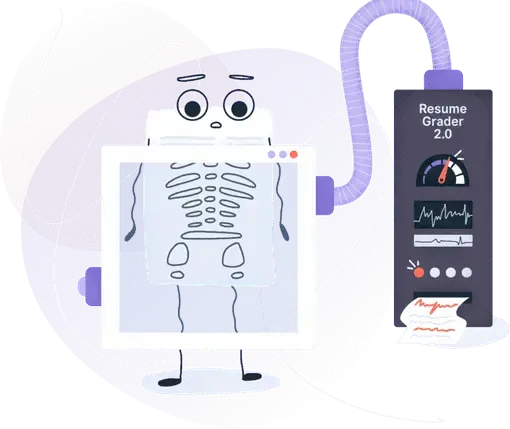Software Testing Skills: Example Usage on Resumes, Skill Set & Top Keywords in 2025
Including software testing on your resume signals to recruiters that you possess a thorough approach to problem-solving and a keen eye for detail. Dive into the guide below to discover effective ways to showcase this skill and enhance your resume's appeal.


Is your resume ATS-friendly?
Drop your resume here or upload a file to find out if the skills in your resume are readable by an ATS.
Software testing skill involves evaluating a program or application to find any glitches, bugs, or errors before it is made available to users. This skill is all about making sure that the software works as intended and is of good quality. A tester will run different scenarios and use various techniques to assess the functionality, performance, and security of the software. By doing so, they contribute to improving the product's reliability and user experience.
Adding software testing to your resume can highlight your analytical thinking, attention to detail, and problem-solving abilities. It shows potential employers that you have a critical eye for improving software products, making you a valuable asset for roles that prioritize quality assurance and control. However, without matching experience or a clear understanding of software testing principles, it may come across as filler or misleading. It's better to combine this skill with relevant experience or to obtain a certification in software testing to demonstrate your genuine expertise in the field.
In this article, you will learn:
- Some disadvantages of listing software testing on your resume without sufficient backing.
- Effective ways to highlight your software testing skills for maximum impact.
- Alternative expressions and synonyms to describe your expertise in software testing.
Misusage of Software Testing on Resumes
Misrepresenting software testing skills on a resume can backfire, damaging credibility and professional reputation. Employers rely on accurate depictions of a candidate's abilities to make informed hiring decisions. Exaggerating or misstating expertise within this technical field can lead to underperformance and missed project goals. Here are three examples of how software testing skills might be improperly reflected on a resume:
- In the summary section, stating "Expert in all forms of software testing, capable of single-handedly ensuring flawless software performance in all projects" when only having experience with basic manual testing methods.
- Within the experience section, claiming involvement in "Leading a team in implementing cutting-edge automated testing protocols for a software project," despite having only observed the process.
- In the achievements section, listing "Dramatically increased software deployment speed by 70% through innovative test automation strategies" without having directly contributed to or measured these improvements.
How to Demonstrate Software Testing Skills on Your Resume
- List specific testing tools you’re proficient in, such as Selenium or JUnit, to demonstrate your technical capabilities.
- Detail your experience with different testing methodologies (e.g., Agile, TDD, BDD) to show your adaptability and process knowledge.
- Describe a complex project you worked on, including the testing challenges you faced and how you overcame them, to highlight your problem-solving skills.
- Quantify your successes, such as by citing any significant bugs you identified or by mentioning the percentage of code coverage achieved, to provide concrete evidence of your effectiveness.
- Illustrate how you stay current with industry trends and enhance your expertise through continuous learning, such as certifications or courses undertaken, to reflect your commitment to professional development.
Example 1: Demonstrate software testing in the experience section
- •Led a team of 5 testers to complete over 1500 automated test cases, increasing test coverage by 25% over two years.
- •Introduced a performance testing suite that reduced load times by 30%, significantly improving user experience for over 1 million customers.
- •Directed cross-functional teams in a major upgrade project that involved rigorous end-to-end testing, resulting in a successful launch with 99.8% uptime.
- •Spearheaded the transition to automated mobile testing, which cut down release cycles by 40% and improved app stability.
- •Managed thorough usability tests for 10+ feature rollouts, with findings leading to critical interface improvements before market release.
- •Facilitated defect tracking and resolution processes, reducing critical bugs by 70% within the first year of implementation.
- •Conducted over 500 hours of manual testing for various web projects, greatly reducing the number of user-reported issues by 80%.
- •Played a pivotal role in a critical security update project that guarded against data breaches for a user base of 500,000+.
- •Collaborated with developers to design test plans and strategies, achieving a significant reduction in post-launch defects by 60%.
- Show results by quantifying achievements; like increasing test coverage or reducing load times, which demonstrates clear impact.
- Include specific projects to give context to your tasks; this showcases your involvement in key projects.
- Vary your language to keep the reader engaged; repeating language can make your resume monotonous.
- Make each bullet point distinct; this shows you can handle various work situations and are adaptable.
- Connect bullet points to business goals; this illustrates that you understand and contribute to the bigger picture.
Example 2: Demonstrate software testing in the summary section
- The summary is straightforward and direct, providing a clear picture of the applicant's experience and skills.
- By stating "over a decade of experience," the summary conveys significant industry involvement without resorting to overused terms.
- A passion for quality is demonstrated, which implies a personal investment in the work without leaning on clichés.
- The specific mention of "manual and automated testing" confirms technical expertise.
- The summary highlights a concrete achievement, "significantly reducing error rates post-launch," demonstrating the applicant's impact in past roles.
- The summary avoids vague terms, instead of offering specific skills and experiences relatable to the job at hand.
- Skill with various types of testing - "regression, performance, and usability" - is clearly detailed, ensuring the reader knows the candidate's capabilities.
- The summary maintains a professional tone and refrains from hyperbolic language, focusing on real qualifications and contributions.
Example 3: Demonstrate software testing in the achievements section
- No use of buzzwords, yet it clearly shows the applicant's ability in the field of quality assurance and software testing.
- Uses specific statistics and results to provide concrete evidence of achievements.
- Each description is concise, avoiding unnecessary words while providing valuable details.
- Tasks are described in a way that shows direct involvement and responsibility.
- Focuses on the impact of the individual’s contributions, giving clear insights into their capabilities.
What Are the Relevant Certifications for Software Testing Skills on Resume
If you're aiming to validate your software testing expertise, consider the following certifications:
The top 5 certifications for gaining software testing skills expertise:
This certificate offers a broad understanding of the key principles and practices in software testing. It can help you establish a strong foundation for a career in testing, covering fundamental topics such as test design and risk management.
The CSTE certification focuses on enhancing your capabilities in software quality testing by focusing on areas like test planning, execution, and management. Aimed at experienced professionals, this credential validates your expertise and commitment to quality standards.
For those with a CTFL certificate looking to dive deeper, the CTAL-TA is a step up that deals with more complex aspects of software testing, such as test analysis and defect categorization, catering to those aiming to specialize in analytical and user-oriented testing roles.
This advanced certification is designed for testing professionals who wish to focus on the technical aspects of software testing, such as non-functional testing and automating tests. It's ideal if you're interested in becoming an expert in the technical challenges of testing activities.
The CMAP certificate focuses on the specialized field of mobile application testing. It helps you stay ahead in this fast-paced area by covering mobile testing techniques, tools, and the peculiarities of mobile platforms, which is crucial when pursuing roles in mobile software development and testing.
Top skills people add together with software testing skill on resume:
Automated Testing
Manual Testing
Test Case Development
Performance Testing
Selenium WebDriver
API Testing
Quality Assurance
Regression Testing
Test Planning
Bug Tracking
Attention to Detail
Critical Thinking
Problem Solving
Time Management
Communication
Teamwork
Adaptability
Organization
Continuous Learning
Stress Management
Empathy
Most Relevant Jobs for Software Testing Skills
If you're involved in the assessment and improvement of software quality, there are numerous job opportunities available to you. Software testing skills are essential in roles where verifying functionality, identifying bugs, and improving the user experience are key parts of the job. These skills are vital for ensuring that applications work as intended and provide a smooth, user-friendly experience.
- Software Tester
- QA Analyst
- Test Engineer
- QA Engineer
- Automation Test Engineer
- Test Manager
- Mobile Tester
- Performance Test Engineer
- Quality Assurance Manager
- Software Development Engineer in Test (SDET)
Key Takeaways
- Software testing skills can make your resume more attractive by showing you can maintain software quality.
- Avoid misusing software testing skills by applying them properly and understanding their scope and limitations.
- Showcase your software testing abilities on your resume by including specific examples and outcomes from past experiences.
Make one that's truly you.




